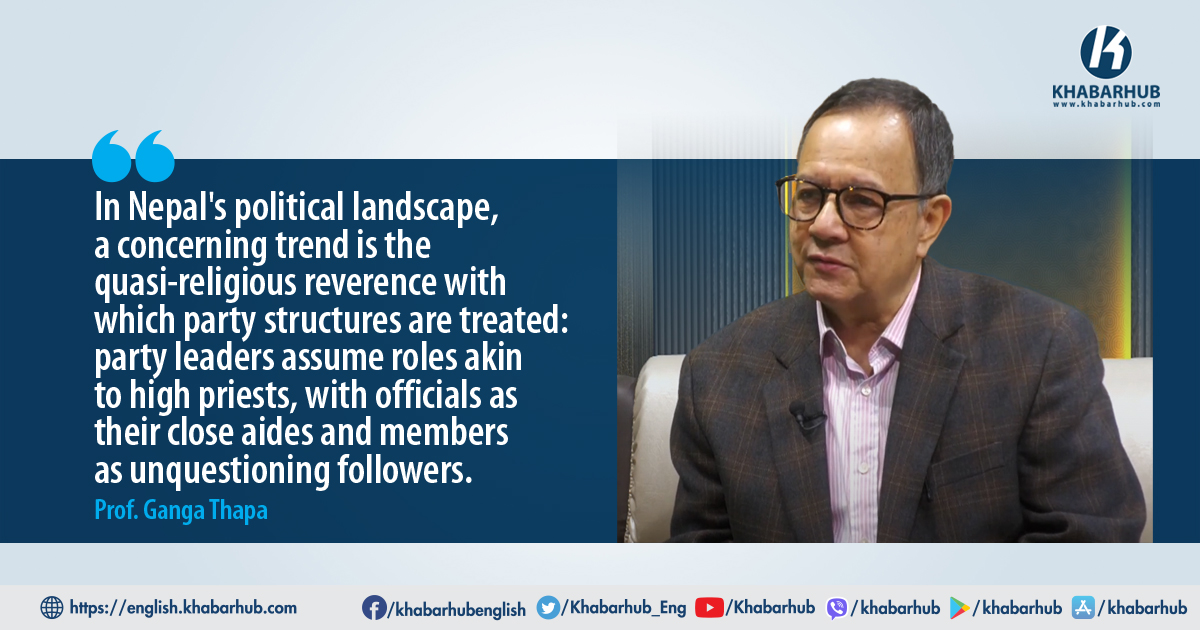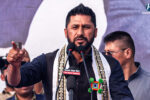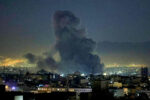The political climate in Nepal is marked by a troubling phenomenon known as the ‘politics of meaning,’ a concept introduced by American political activist Michael Lerner.
This approach emphasizes that politics should address not only material and economic concerns but also the deeper existential questions people have about purpose, connection, and community.
Largely unnoticed by the international community, Nepal’s governance is shaped by a coalition of hypo politicians—Khadga Prasad Oli, Sher Bahadur Deuba, and Pushpa Kamal Dahal, collectively referred to here as ‘ODD.’
They serve as a repugnant example of how democratic systems can be misused.
For this group, the ideals of liberal democracy and the rule of law often feel too distant or abstract to meaningfully impact daily life.
Their ideologies seem rooted in control, cultivating a system of governance that resonates with totalitarianism.
Despite wielding fearsome, top-down powers of the state and promoting a bureaucratic, irrational, and centralized approach, this strategy has largely failed to meet the expectations of the majority of Nepalese citizens.
Politicians such as Madhav Kumar Nepal and Baburam Bhattarai also align with these tendencies, promoting agendas that reveal a nearly authoritarian edge, particularly when considering the broader democratic and republican aspirations of Nepal’s recent history.
Consequently, public discontent is widespread. Many programs aimed at socioeconomic improvement have failed, leaving a deeply divided society where both citizens and political factions are locked in a cycle of disillusionment.
Another troubling reality of Nepal’s current Arzoo Deuba-Khadga Oli government is the sheer number of players involved.
A word about both Arzoo and Khadga: they are widely regarded as predominantly selfish, highly corrupt, and immoral, often seeking to dominate public discourse with hidden agendas for personal gain.
Although Nepal has never had a guiding principle that truly serves everyone’s interests, it seems that Khadga Oli’s tenure as Prime Minister will last only as long as his foreign minister, Mrs. Arzoo Deuba, chooses to pull the petticoat strings.
A key point of pride in principle, what we still call liberal democracy rests on secular values and the idea of perfectibility—a core liberal belief. In Nepal, ongoing political activism aspires to establish both liberal and social democracy in the political environment.
However, the pursuit of reason and democracy as tools of human perfection has, in some cases, led to disturbing consequences, including unspeakable atrocities like rape and torture.
This persistent stagnation reflects a failure to translate public will into action.
Progressive movements have tried to dismantle entrenched social and economic inequalities, yet they have not succeeded in unifying the political class under a coherent, transformative vision for the nation.
Consequently, Nepali politics often appears focused on surface-level reforms rather than tackling deeply rooted structural issues, with public discourse frequently echoing an undercurrent of self-interest.
This reflects what might be called a form of ‘revenge politics,’ where decisions are driven more by settling scores than advancing society.
Political scholars in Nepal often express frustration over these issues, noting that many could have been avoided through proactive and accountable governance.
However, the persistent corruption and erosion of democratic values seem almost intentional, designed to keep the democratic support base inactive and uninspired, ultimately jeopardizing the stability of the democratic project itself.
As a result, Nepal appears to be at a political crossroads. This is a defining moment in which future transformations could either cement democratic values or further entrench authoritarian control.
Amid the many challenges of Nepal’s democratic transition, the country faces a serious risk: despite having a constitution that enshrines democratic principles and holding multiple elections, it may become a puppet state controlled by political elites.
These elites, whether through ideology or economic power, have managed to trap the nation in their grip, allowing an oligarchy to reign.
Reflecting on my own interactions with Nepal’s political landscape, I now see how my engagement, often tinged with sarcasm, failed to prompt meaningful change.
Instead, my idealism may have contributed to a misplaced emphasis on moderation.
This approach, in retrospect, was an insufficient response to the systemic challenges Nepal faces, and a missed opportunity for promoting more substantive reforms.
My attachment to Nepal and belief in its potential for decency runs deep.
However, leaders like ODD, along with Madhav Nepal and Baburam Bhattarai, have consistently promoted a cynical, self-centered style of governance.
Their actions, bereft of moral values or public accountability, often border on the absurd, fueling what can only be described as a political cult.
Their self-aggrandizement and inflated egos have stifled Nepal’s democratic potential, making the hope for a transformative political moment seem remote.
This underscores the need for a collective societal effort to rebuild and unify the nation around a vision of meaning and authenticity in policy-making, one that could truly transform Nepal’s future.
The 2015 Nepali Constitution was supposed to be a framework for equity and consistency, designed to safeguard public interests against abuses by political elites.
However, its failure to ensure accountability for maverick and mendacious politicians like Madhav Kumar Nepal, Baburam Bhattarai, Finance Minister Bishnu Poudel, and Supreme Court Justice Kumar Regmi, —who remain unpunished for their roles in the Baluwatar land scandal—raises serious questions.
Foreign Minister Arzu Rana Deuba, allegedly linked to human trafficking, and Prime Minister Khadga Prasad Oli, accused of seizing public land, namely ‘Giri Bandhu Tea State’ along with Sher Bahadur Deuba, implicated in the Wide-Body aircraft scandal, are similarly untouched by the legal system.
Such unaccountability creates a political culture that resembles a ‘cult’ more than a democratic leadership.
Politicians like Oli and the Deuba family seem to operate with impunity, prioritizing personal agendas over public good.
This reinforces a system of shadowy interests, where unchecked dominance prevails over constitutional values.
These politicians, though aware of the public’s voice, often choose to ignore it to evade accountability.
Their priorities tend to center around preserving personal reputation and power, rather than addressing public concerns.
In Nepal, individuals committed to integrity frequently lack real influence as public servants across various sectors.
In the judicial context, the emphasis often falls on presenting evidence rather than uncovering the truth.
This disparity in justice raises critical questions: Why are politicians like Rabi Lamichhane and Top Bahadur Rayamajhi held accountable, while others—like cooperative scammers who defrauded depositors—go free?
This selective justice reflects a disconnect between the Constitution’s ideals and the actual governance practices, further entrenching this cult-like grip on political power.
For decades, Nepal’s political discourse has been marked by a fascination with ideals like liberalism, welfare state concepts, and identity politics.
These ideas are often presented as virtuous goals, yet their impact on the public psyche has, in some ways, been corrosive.
They have fostered unrealistic expectations and have distanced the people from the true functioning of the state.
In the context of Nepal’s political environment, these ideals are sometimes adopted superficially, used by leaders more as rhetorical devices than as principles for genuine reform.
This facade has created a sort of cancer in the body politic, eroding public trust in political leadership and democratic processes.
The unifying view across Nepal’s political spectrum seems to be that democracy, as a concept, is not intrinsically ‘dysgenic or degenerative.
Yet, while democratic systems elsewhere are often linked to freedom and civic empowerment, in Nepal, democratic leaders use humor and clever rhetoric to mask troubling realities.
This trivialization of serious issues allows them to avoid accountability while caricaturing themselves to the public.
Their behaviors echo a totalitarian desire for control, with only a superficial nod to democratic principles.
Their sycophantic followers, who idolize these leaders, further distort Nepal’s political climate.
These followers, operating almost as a cult-like class, elevate leaders’ actions, however dubious, to near-sacred status.
This dynamic resembles the loyalty observed in religious rituals, where even questionable actions are justified.
While such reverence may seem irrational, it speaks to the deep-seated challenges facing Nepal’s democracy.
Today’s political reality may seem intractable, but circumstances are always shifting, and what seems impossible today might become achievable tomorrow if prepared with resilience and vision.
A particularly concerning aspect of this political landscape is the decline in moral integrity within political parties, where leaders act like high priests and party members serve as unquestioning disciples.
Politicians like ODD show no tolerance for dissent, eliminating any semblance of internal party democracy.
This dynamic stifles discussion and innovation, rendering party structures rigid and incapable of evolving.
Party officials and cadres may meet with their leaders, yet any dissenting views are dismissed outright, leaving no room for meaningful internal debate or reform.
The coalition of leaders like Oli and Deuba couple has controlled resources and wielded power for personal and party interests, benefiting only those in close proximity to their influence.
This exclusive focus on party loyalty and factional agendas has caused a tremendous setback to Nepal’s democratic journey.
Their governance does not reflect strategic planning but rather a stagnation of political energy.
Their domination of the state apparatus has paralyzed the political climate, instilling a pattern of negative governance that undermines the progress of Nepal’s democratic institutions.
Harvard Professor Yascha Mounk once remarked that liberal democracy is ‘no longer the only game in town.’
Ironically, in Nepal, it often serves as a cover for socialism, where public resources are distributed to loyalists rather than the broader population.
Leaders exploit state wealth to secure their support base, obscuring their motives with empty promises and manipulating public opinion with misleading narratives.
This approach remains a formidable obstacle to establishing a stable political order based on genuine public welfare.
This outcome could reveal much about the judiciary’s role in shaping political landscapes and its potential influence on public trust in American democratic institutions.
Consequently, public discontent is widespread. Many programs aimed at socioeconomic improvement have failed, leaving a deeply divided society where both citizens and political factions are locked in a cycle of disillusionment.
This has led to calls for fundamental change in Nepal’s governance, growing louder as frustrations mount over poverty, unemployment, and corruption.
Still, there are committed individuals who advocate for a renewed political vision—one that prioritizes integrity, social justice, and respect for democratic values.
This vision, if pursued with tenacity, could restore hope for a fairer and more accountable Nepali democracy.
Nepal’s path to democratic consolidation remains complex, hindered by deep-seated political interests.
Yet, global examples highlight the critical role of justice and accountability in fostering public confidence in democratic institutions.
In Nepal’s political landscape, a concerning trend is the quasi-religious reverence with which party structures are treated: party leaders assume roles akin to high priests, with officials as their close aides and members as unquestioning followers.
Those who dissent or seek genuine democratic debate within the party find themselves marginalized, leaving little room for intra-party democracy.
Observing recent US’s presidential elections, for instance, Donald Trump’s potential return to power in the United States is often viewed as a populist distortion of American presidential democracy.
However, should he succeed in mediating peace in areas like Ukraine and the Middle East, he could still shape a significant legacy.
At the same time, this election reveals lingering gender biases within American society, as many voters remain skeptical of female leaders.
The potential re-election of Trump should not be seen as a testament to political dynamism.
To reiterate a point I made in my February 3, 2004, op-ed in The Himalayan Times: historical figures like Mussolini, who was elected twice, and Hitler, known for his abstinence from smoking, vegetarianism, and love for animals, were not inherently more admirable or morally grounded than Winston Churchill, who drank heavily and smoked openly.
The core argument remains that people are never truly safe under authoritarian rule. Assuming that a Trump victory would provide a solution to global conflicts would be a grave miscalculation.
Over the past thirty-five years, despite numerous terms as Prime Minister or minister by politicians like Oli, Deuba, Dahal, Bhattarai, and Koirala, no politician in Nepal has garnered the same level of genuine, selfless public support as Kathmandu Mayor Balen Shah.
Furthermore, it remains to be seen how American ‘judicial activism’ will unfold in Trump’s case—specifically, whether the courts will acquit him of all charges he currently faces.
This outcome could reveal much about the judiciary’s role in shaping political landscapes and its potential influence on public trust in American democratic institutions.
It remains entirely unclear to me why the Biden administration chose to involve itself in the Ukraine war, investing billions in what appears to be a zero-sum outcome.
Such actions do little to foster a peaceful, competitive, and healthy global society.
One might argue that the Democratic Party’s recent loss in the US could stem from its centrist political stance; however, it also appears increasingly out of touch with the concerns of the public.
The party could benefit from a thorough restructuring, emphasizing clear, actionable policies and priorities rather than relying on overly idealistic visions.
Politics is a cutthroat game where those in power rarely relinquish control. Although the past cannot be changed, a strategic move by Biden could have altered the election outcome.
For instance, if he had resigned in support of Kamala Harris, she would have become the President of the United States, potentially changing the course of the election.
Given the Democratic Party’s losses with two female candidates, Biden could still consider resigning, making Harris the 47th President, even if only briefly.
This move would not only strengthen the party’s image but also pave the way for a female president in the upcoming election.
There is an adage that while anyone can cultivate a tree in fertile conditions, there is a distinct satisfaction in nurturing one in a desert.
Here, the words of U.S. Democratic Party candidate Kamala Harris—that a prolonged struggle does not signify defeat—offer a timely reminder. Disappointment should not overshadow perseverance.
Over the past thirty-five years, despite numerous terms as Prime Minister or minister by politicians like Oli, Deuba, Dahal, Bhattarai, and Koirala, no politician in Nepal has garnered the same level of genuine, selfless public support as Kathmandu Mayor Balen Shah.
This gives us hope that a progressive, egalitarian state is possible.









Comment